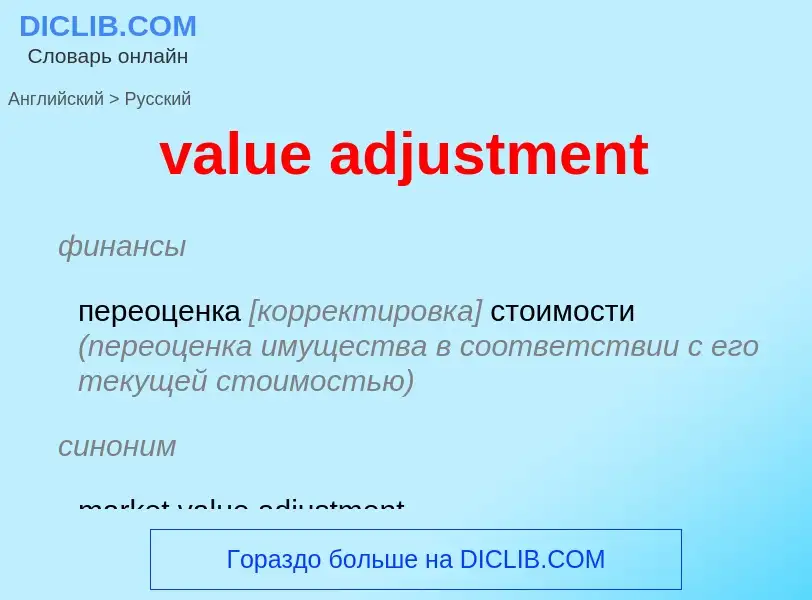Tradução e análise de palavras por inteligência artificial ChatGPT
Nesta página você pode obter uma análise detalhada de uma palavra ou frase, produzida usando a melhor tecnologia de inteligência artificial até o momento:
- como a palavra é usada
- frequência de uso
- é usado com mais frequência na fala oral ou escrita
- opções de tradução de palavras
- exemplos de uso (várias frases com tradução)
- etimologia
value adjustment - tradução para Inglês
финансы
переоценка [корректировка] стоимости (переоценка имущества в соответствии с его текущей стоимостью)
синоним
Смотрите также
Definição
Wikipédia
Structural adjustment programs (SAPs) consist of loans (structural adjustment loans; SALs) provided by the International Monetary Fund (IMF) and the World Bank (WB) to countries that experience economic crises. Their purpose is to adjust the country's economic structure, improve international competitiveness, and restore its balance of payments.
The IMF and World Bank (two Bretton Woods institutions) require borrowing countries to implement certain policies in order to obtain new loans (or to lower interest rates on existing ones). These policies are typically centered around increased privatization, liberalizing trade and foreign investment, and balancing government deficit. The conditionality clauses attached to the loans have been criticized because of their effects on the social sector.
SAPs are created with the stated goal of reducing the borrowing country's fiscal imbalances in the short and medium term or in order to adjust the economy to long-term growth. By requiring the implementation of free market programmes and policy, SAPs are supposedly intended to balance the government's budget, reduce inflation and stimulate economic growth. The liberalization of trade, privatization, and the reduction of barriers to foreign capital would allow for increased investment, production, and trade, boosting the recipient country's economy. Countries that fail to enact these programmes may be subject to severe fiscal discipline. Critics argue that the financial threats to poor countries amount to blackmail, and that poor nations have no choice but to comply.
Since the late 1990s, some proponents of structural adjustments (also called structural reform), such as the World Bank, have spoken of "poverty reduction" as a goal. SAPs were often criticized for implementing generic free-market policy and for their lack of involvement from the borrowing country. To increase the borrowing country's involvement, developing countries are now encouraged to draw up Poverty Reduction Strategy Papers (PRSPs), which essentially take the place of SAPs. Some believe that the increase of the local government's participation in creating the policy will lead to greater ownership of the loan programs and thus better fiscal policy. The content of PRSPs has turned out to be similar to the original content of bank-authored SAPs. Critics argue that the similarities show that the banks and the countries that fund them are still overly involved in the policy-making process. Within the IMF, the Enhanced Structural Adjustment Facility was succeeded by the Poverty Reduction and Growth Facility, which is in turn succeeded by the Extended Credit Facility.

